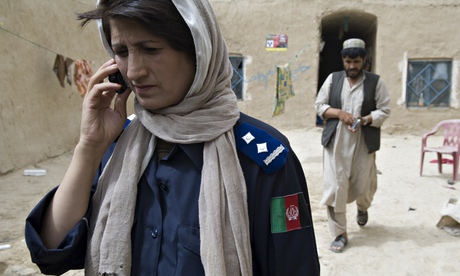
A pioneering Afghan policewoman who fought for women's rights and was gunned down by the Taliban for her work has been used as a symbol of Islamic extremism by far-right UK group Britain First and an Australian senator campaigning for a ban on burqas.
Both have shared on Facebook a decade-old portrait of Lieutenant-Colonel Malalai Kakar wearing a powder blue burqa and brandishing a pistol, now overlaid with warnings in red. "Terror attack level: Severe. An attack is highly likely," one message reads. Below her arm is another slogan: "For security reasons it's now time to ban the burqa."
The picture was taken in early 2005 as Kakar prepared to head out on a mission to free a kidnapped teenager, throwing a burqa over her Afghan national police uniform at the last minute. They brought the girl home safe a few hours later.
"This is not what I wanted for this photograph," said photographer Lana Slezic, who was captivated by Kakar's strength and compassion. "To see an image of her and all she still represents used this way is such an insult to her and her family and all the women in Afghanistan. I don't even have the words to describe it."
A mother of six from southern Kandahar city, Kakar was the first female graduate of the regional police academy. She commanded a unit fighting crimes against women, in a conservative area where plenty of men thought they did not deserve any rights.
Known both for bravery and efficiency, she was kind to the women who sought refuge in her office, sometimes still dripping blood, but ruthless to the criminals she tracked down: rapists and vicious husbands, killers and kidnap gangs, Taliban and thieves.
"She was a force of a woman, she was incredible. In my two years in Afghanistan, she was the one who really gave me hope for the future," said Slezic, who returned to photograph Kakar so many times that the two women eventually became friends.
The fearless daughter of a policemen, Kakar defied Taliban death threats and warnings to give up work, enlisting a brother to serve as a bodyguard.
She saw the traditional covering she wore outside the office not as being a burden but as an extra layer of security.
"I am not forced to wear the chaudari [burqa], my husband or the police force does not require it. I want to wear it because it gives me advantages," she told a documentary film-maker before her death. "I wear it to protect my family and myself."
But in 2008 two gunmen who had been trailing the police colonel ambushed her car with AK-47s as she left for work, killing her instantly and badly wounding one of her sons, who was travelling with her.
"When I heard about her assassination, I collapsed," Slezic said. "It doesn't matter how many years pass, when I think about the way she was killed in front of her home, and in front of her child, it's still raw."
The modified portrait of Kakar was first posted on Britain First's Facebook page in late August with the caption: "Do you agree that the burqa is a security risk?" Since then it has picked up over 31,000 "likes" and been shared more than 43,000 times.
Paul Golding, the party's leader, said that his team found the image on the internet and shared it, without checking its origins. When he was told about Kakar's work and assassination, he said that it was "very upsetting", but he did not plan to take the picture down. "Not at all," he said.
The image was pushed further into the spotlight last week when it was shared again on the Facebook page of Jacqui Lambie, a conservative Australian senator, who is calling for a nationwide ban on burqas. She did not respond to requests for comment.
Slezic has asked Britain First and Lambie to take down the image, because it violates her copyright. She already has legal advice, because copies of the picture have been doctored before to carry an anti-Islam message.
Experts warn that it is a problem that is only likely to expand as the role of social media in attracting funds and supporters increases. "Social media is playing a key role in radicalising both Islamists and the far right," said Haras Rafiq, outreach officer at the Quilliam Foundation, a counter-extremism thinktank, who said that the image of Kakar links "the burqa and Muslims and Islam with terror".
"Decontextualisation and hijacking of images is becoming more and more common, and more and more effective. The general public don't question images … as much as they should do."
Software to modify photographs is now cheap and easy to use, so there are few technical barriers to making a portrait of an assassinated policewoman a cipher for extremism, rather than a source of inspiration.
"Her life was threatened many times, and she never gave up because she was empowered by the women around her, and she really felt what she was doing was important," Slezic said.

